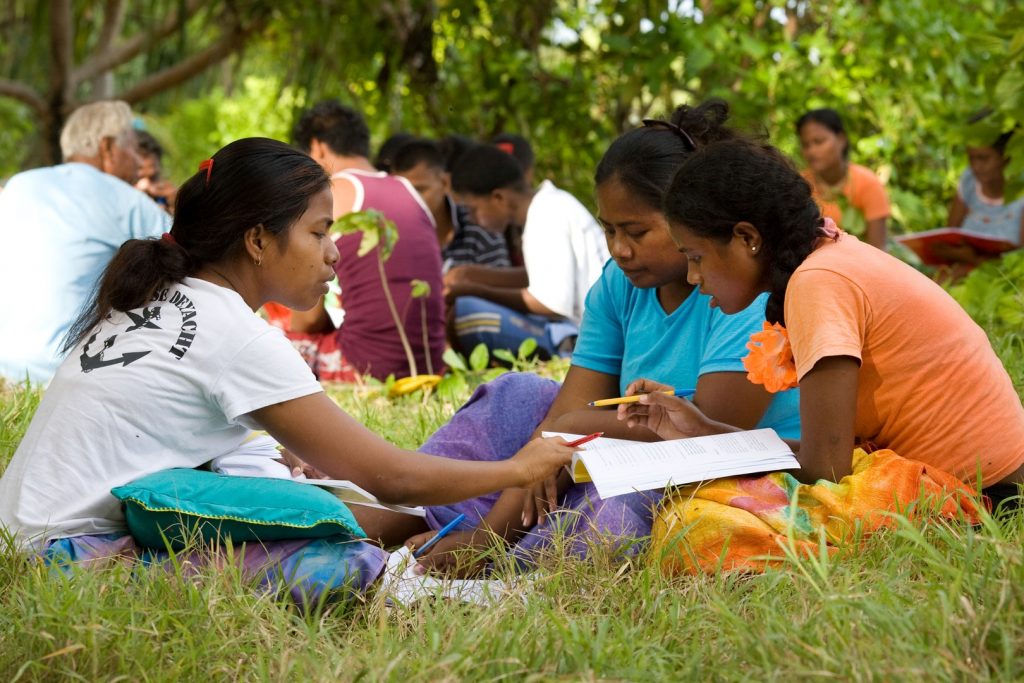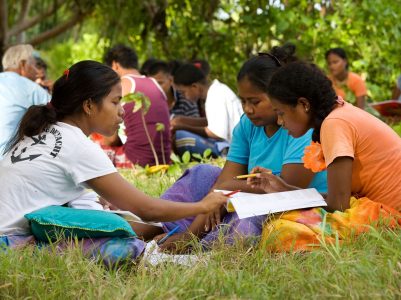By Ms. Bani Dugal, Co-Chair of the Multi-Faith Advisory Council to the United Nations Interagency Task Force on Religion and Sustainable Development.
Religion has been a force for social cohesion throughout the ages. Many agree that religious belief touches the deepest roots of human motivation, that it is a social phenomenon that plays out at massive scales, and that its impact on the systems and structures of society are numerous, interrelated, and complex.
Since the establishment of the United Nations, countless religious voices have been drawn on for the moral vision they provide. Some faith-based organizations, including the one I represent, were registered at the UN as early as 1948. They have been working together with a range of various NGOs, whether inspired by faith or not, to promote policies that are just and inclusive. Several faith communities were invited to submit their recommendations to the Commission on Human Rights and played an important role in crafting the Universal Declaration of Human Rights, an instrument that has come to be accepted as representing the highest aspirations of humanity. Faith-based organizations registered at the UN have also been instrumental in supporting the realization of numerous conventions and other agreements and are already working toward the fulfilment of the Sustainable Development Goals.
Yet, the value of drawing on faith actors for the hopeful vision they can offer and on referencing faith as a source of knowledge is not universally recognized. Some want nothing to do with religion. This concern is not unwarranted, for unfortunately, religion, whose very reason for being is service to the well-being of humanity, has sometimes been used contrary to what its truest purpose represents. In its basest expression, it has lent its credibility to fanaticism or has been the source of contention. Such a perversion of religion is deplorable. Indeed, the Writings of the Baha’i Faith affirm that when religion deviates from its true purpose, it would be preferable that it cease to exist:
If long-cherished ideals and time-honored institutions, if certain social assumptions and religious formulae have ceased to promote the welfare of the generality of mankind, if they no longer minister to the needs of a continually evolving humanity, let them be swept away and relegated to the limbo of obsolescent and forgotten doctrines. Why should these, in a world subject to the immutable law of change and decay, be exempt from the deterioration that must needs overtake every human institution?[1]
Another significant obstacle to drawing on the potential of religion is the fact that not all communities throughout the world have the freedom to express and practice their religious beliefs. Yet it is generally accepted that the realization of development goals are interrelated with fundamental freedoms. Such an affirmation prompts an earnest re-examination of the role of freedom of thought, conscience, and religion in the pursuit of a peaceful, prosperous, and just society. Given that religious and cultural norms of faith communities have proven to be powerful determinants of attitudes and behaviors, their role, then, is indispensable in promoting the religious freedom that forms part of the foundation for a flourishing civilization.
At the level of the United Nations, the Multi-Faith Advisory Council to the United Nations Interagency Task Force on Religion and Sustainable Development (MFAC) is committed to tapping into the potential of true religion. The Council recognizes that a focus on material development alone will continue to fall short of meeting humanity’s mounting needs and addressing the root causes of the many challenges before society. The members of the Council work to help religious communities relate to and better understand the SDGs—thereby gaining their commitment, support, and collaboration. Recognizing that grassroots development efforts are critical to the achievement of the SDGs, the Council works to encourage and facilitate partnerships between the UN and faith-based organizations. For its part, the Baha’i International Community has been engaging with the MFAC as well as with various interfaith groups and agencies including Religions for Peace and the Interfaith Alliance for Safer Communities. Indeed, we have learned that strengthening relationships at all levels, including those among people of different faiths, must be at the heart of any sustainable and successful development effort.
Beyond action at the level of the UN, a growing number of faith communities worldwide are demonstrating at the grassroots that the unifying power and transformative potential of religion is not lost. Baha’i communities worldwide, together with their collaborators from diverse backgrounds, have been inspired to arise as active protagonists committed to the well-being of humanity. The nature of their efforts span a wide range of initiatives. Some offer hope through the vision for a prosperous humanity that their teachings provide. Others are applying spiritual principles to the material betterment of their societies. Many are enriching public discourse through the exploration of spiritual concepts that are most needed to respond to today’s challenges. These include efforts to cultivate a greater appreciation for humanity’s shared identity and the need to work together toward a common endeavor.

As we come to the 75th anniversary of the United Nations, many actors have paused to reflect on how the needs of humanity can truly be met. The occasion signals an opportunity to reconsider what structures and approaches can best respond to the exigencies of the time. So too, we should be thinking about how our conception of the role of religion, in the life of the individual and society, should evolve. Religion has a unique power. Indeed, it has the potential to awaken in whole populations capacities to love, to forgive, to create, to dare greatly, to overcome prejudice and to sacrifice for the common good. But if religion is to be a vital force, it must be re-examined in the light of this current age of transition in humanity’s social evolution, having passed through a stage of infancy and childhood, and now moving through adolescence to its state of maturity. For a humanity coming of age, religion must be seen as an indispensable source of knowledge. Scientific advance without moral and ethical insight cannot speak to the highest aspirations of humanity and can, in some instances, lead to devastating effects. How can both be drawn on as complementary sources of knowledge with the aim of contributing to civilization? How can we channel true religion’s unifying purpose in forging a more cohesive society?
Ultimately, the role of religion in society and in sustainable development must be further highlighted in UN discourse and policy. Were it to truly be drawn on, faith could impart a light amidst a darkened world and infuse a materialistic society with a valuable source of insight. Much needs to be done to channel its full potential and to shift the way we view this important source of knowledge. As we are reimagining various processes and structures to respond to rapidly changing realities, so too must our conception of spirituality and its role evolve. This, the Baha’i Writings affirm:
In the unmistakable and universal reformation we are witnessing, when outer conditions of humanity are receiving such impetus, when human life is assuming a new aspect, when sciences are stimulated afresh, inventions and discoveries increasing, civic laws undergoing change and moralities evidencing uplift and betterment, is it possible that spiritual impulses and influences should not be renewed and reformed? Naturally, new spiritual thoughts and inclinations must also become manifest. If spirituality be not renewed, what fruits come from mere physical reformation?[2]
– – –
Ms. Dugal is the Principal Representative of the Baha’i International Community to the United Nations and serves as Co-Chair to the Multi-Faith Advisory Council to the United Nations Interagency Task Force on Religion and Sustainable Development.
[1] Shoghi Effendi, The World Order of Bahá’u’lláh.
[2] ‘Abdu’l-Baha, The Promulgation of Universal Peace.


